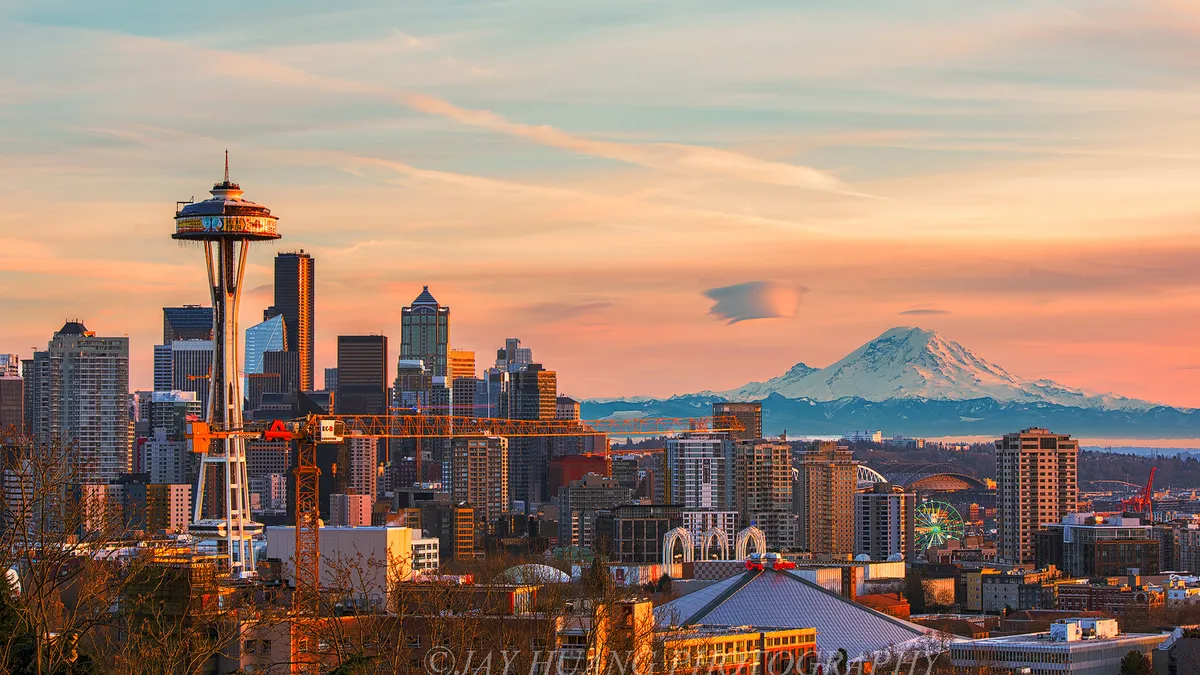Dive Brief:
-
Puget Sound Energy (PSE) asked its customers in Seattle, Tacoma and other Washington cities to conserve natural gas and electricity this week following a Tuesday night pipeline rupture in British Columbia.
-
The pipeline operator, Enbridge, said Wednesday it was restarting a separate pipeline to restore capacity to its customers, including PSE. PSE announced a return to normal operations on Thursday, but will continue to monitor the system as Enbridge works on their supply pipeline.
-
PSE looked to secure other gas supplies to help bring more power to the area, according to utility spokesperson Andrew Padula. "We switched our natural gas generation to alternative fuels and we are in the process of bringing back one of our storage facilities that was scheduled for maintenance," he told Utility Dive on Wednesday.
Dive Insight
Critics of natural gas infrastructure and use could point to this incident as another example of the vulnerability of transport systems.
The high pressure natural gas line rupture affects Western Washington, including PSE, Avista and Cascade Natural Gas' service areas. All three companies relied on the pipeline for their gas supply, with PSE operating more than 1.4 GW of gas-fired power plants in the state.
Avista’s and Cascade’s residential and business customers were also signaled to resume normal usage on Thursday. Industrial customers were advised to hold off on returning to normal usage as the region’s gas supply increases. Cascade estimated its industrial customers would be permitted to resume their usage over the course of Thursday and Friday.
“All supply chains have vulnerabilities," and the issue is not unique to fossil fuels, according to Kate Griffith, Washington Utilities and Transportation Commission (UTC) spokesperson.
Proponents clean energy infrastructure have argued that such vulnerabilities show a growing need for distributed renewable resources and energy storage, to establish more resilient microgrids.
The UTC is conducting an integrated resource planning process regarding these energy assets.
"As those resources become clearly least-cost options, their development will expand and we’ll see them integrate more into our energy infrastructure," Griffith told Utility Dive via email.
To offset the impacts of a curtailed gas supply, PSE had asked residential and commercial customers to lower their thermostats and take other energy-saving actions.
Padula said the utility was trying to get its Jackson Prairie Storage Facility "up and running" on Wednesday, to provide backup in case the natural gas constraints continue on or beyond Thursday.
The gas constraint and conservation efforts were expected to continue for a few days, according to a video tweet from Andy Wappler, customer operations and communications vice president at PSE.
A message and update about natural gas from our Vice President, Andy Wappler. pic.twitter.com/DXAz63hfmK
— Puget Sound Energy (@PSETalk) October 10, 2018
After depressurizing and shutting down the ruptured 36-inch pipeline and an adjacent 30-inch pipeline on Tuesday, Enbridge received approval on Wednesday evening to restart the smaller pipeline. The pipeline operator said the line would be brought up to 80% of its normal operating capacity, according to a press statement.
Enbridge is also working with its industry partners on sourcing alternate supplies of gas, according to a press statement.
The largest gas pipeline operator in the Northwest, Williams Pipeline, also issued a call to conserve natural gas use in order to maintain service in the region.
"We have received strong support from customers and interconnecting pipelines in response to this interruption, including industrial customers and electric generators that have voluntarily reduced loads on the system," the company said in a statement.
Correction: A previous version of this article misstated the type of pipeline involved in the incident. It was a high pressure natural gas line.














